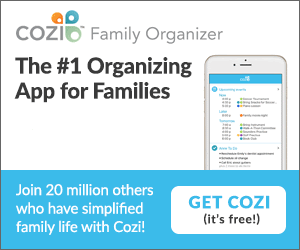There are benefits to organizing besides just a neater home. In fact, the entire family can gain from getting organized. Here are some ways that organizing time, stuff, and schedules can benefit everyone.
Finding Stuff
How many family fights begin with someone unable to find something? For example, the ever-elusive remote control seems to be missing; the family member who wants to watch TV gets frustrated and starts blaming others for losing the remote. The blamed family members get upset and say it's not their fault, and then a big fight ensues.
Here's another scenario: you're trying to get out the door and your kids can't find their shoes, books, whatever. You become frustrated and so do they, and tempers flare.
So being able to find stuff can go a long way toward creating family peace. Designate a place for those "slippery" items that tend to cause controversy: shoes, remotes, adapters, books. Each family member can have his or her basket to keep miscellaneous things in, and you can put a shoe rack or big basket/bucket by the door for shoes. You can also keep a list by your front door of what to check for before you leave: library books, glasses, keys, etc.
Routine
Experts point out that children feel much more secure when there's a routine. Establishing routines is part of family organization, and can definitely make for happier family members. Routines give everyone a sense of calm, because you know what's coming next (to an extent, of course). Adults and kids alike benefit from a regular routine and tasks that are made into habits.
Regular Family Meetings
As you establish a routine, work regular family meetings into the schedule. Maybe once a week or once a month works best for your family; whatever makes for a regular time to get together and air concerns, offer solutions, and brainstorm. Maybe tie it in with something fun, like pizza and movie night or serve a special dessert during the meeting (offices use this tactic by offering doughnuts at meetings!).
Meetings are a great time to get everyone's schedule worked out and understood, and for family members to speak up about things that are bothering them. It's also a good time to establish rules and make sure everyone understands what they are.
Better Communication
As families organize their time and personal items, communication tends to open up. For one thing, more time is available for spending together as a family - you're not wasting time arguing and looking for stuff. Also, since organizing involves family meetings, you will have more of a chance to talk things out with other family members.
Less Clutter = Less Stress SM in your home, your business and your life
Organizational
Consulting Services
Visit our Life & Business Coaching website: North By Northwest





